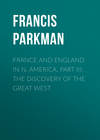Kitabı oku: «France and England in North America, Part VI : Montcalm and Wolfe», sayfa 34
Three brigadiers, all in the early prime of life, held command under him: Monckton, Townshend, and Murray. They were all his superiors in birth, and one of them, Townshend, never forgot that he was so. "George Townshend," says Walpole, "has thrust himself again into the service; and, as far as wrongheadedness will go, is very proper for a hero."699 The same caustic writer says further that he was of "a proud, sullen, and contemptuous temper," and that he "saw everything in an ill-natured and ridiculous light."700 Though his perverse and envious disposition made him a difficult colleague, Townshend had both talents and energy; as also had Monckton, the same officer who commanded at the capture of Beauséjour in 1755. Murray, too, was well matched to the work in hand, in spite of some lingering remains of youthful rashness.
On the sixth of June the last ship of the fleet sailed out of Louisbourg harbor, the troops cheering and the officers drinking to the toast, "British colors on every French fort, port, and garrison in America." The ships that had gone before lay to till the whole fleet was reunited, and then all steered together for the St. Lawrence. From the headland of Cape Egmont, the Micmac hunter, gazing far out over the shimmering sea, saw the horizon flecked with their canvas wings, as they bore northward on their errand of havoc.
Note.—For the material of the foregoing sketch of Wolfe I am indebted to Wright's excellent Life of him and the numerous letters contained in it. Several autograph letters which have escaped the notice of Mr. Wright are preserved in the Public Record Office. The following is a characteristic passage from one of these, written on board the "Neptune," at sea, on the sixth of June, the day when the fleet sailed from Louisbourg. It is directed to a nobleman of high rank in the army, whose name does not appear, the address being lost (War Office Records: North America, various, 1756-1763): "I have had the honour to receive two letters from your Lordship, one of an old date, concerning my stay in this country [after the capture of Louisbourg], in answer to which I shall only say that the Marshal told me I was to return at the end of the campaign; and as General Amherst had no other commands than to send me to winter at Halifax under the orders of an officer [Brigadier Lawrence] who was but a few months before put over my head, I thought it was much better to get into the way of service and out of the way of being insulted; and as the style of your Lordship's letter is pretty strong, I must take the liberty to inform you that … rather than receive orders in the Government [of Nova Scotia] from an officer younger than myself (though a very worthy man), I should certainly have desired leave to resign my commission; for as I neither ask nor expect any favour, so I never intend to submit to any ill-usage whatsoever."
Many other papers in the Public Record Office have been consulted in preparing the above chapter, including the secret instructions of the King to Wolfe and to Saunders, and the letters of Amherst to Wolfe and to Pitt. Other correspondence touching the same subjects is printed in Selections from the Public Documents of Nova Scotia, 441-450. Knox, Mante, and Entick are the best contemporary printed sources.
A story has gained currency respecting the last interview of Wolfe with Pitt, in which he is said to have flourished his sword and boasted of what he would achieve. This anecdote was told by Lord Temple, who was present at the interview, to Mr. Grenville, who, many years after, told it to Earl Stanhope, by whom it was made public. That the incident underwent essential changes in the course of these transmissions,—which extended over more than half a century, for Earl Stanhope was not born till 1805,—can never be doubted by one who considers the known character of Wolfe, who may have uttered some vehement expression, but who can never be suspected of gasconade.
CHAPTER XXV.
1759
WOLFE AT QUEBEC
French Preparation • Muster of Forces • Gasconade of Vaudreuil • Plan of Defence • Strength of Montcalm • Advance of Wolfe • British Sailors • Landing of the English • Difficulties before them • Storm • Fireships • Confidence of French Commanders • Wolfe occupies Point Levi • A Futile Night Attack • Quebec bombarded • Wolfe at the Montmorenci • Skirmishes • Danger of the English Position • Effects of the Bombardment • Desertion of Canadians • The English above Quebec • Severities of Wolfe • Another Attempt to burn the Fleet • Desperate Enterprise of Wolfe • The Heights of Montmorenci • Repulse of the English.
In early spring the chiefs of Canada met at Montreal to settle a plan of defence. What at first they most dreaded was an advance of the enemy by way of Lake Champlain. Bourlamaque, with three battalions, was ordered to take post at Ticonderoga, hold it if he could, or, if overborne by numbers, fall back to Isle-aux-Noix, at the outlet of the lake. La Corne was sent with a strong detachment to intrench himself at the head of the rapids of the St. Lawrence, and oppose any hostile movement from Lake Ontario. Every able-bodied man in the colony, and every boy who could fire a gun, was to be called to the field. Vaudreuil sent a circular letter to the militia captains of all the parishes, with orders to read it to the parishioners. It exhorted them to defend their religion, their wives, their children, and their goods from the fury of the heretics; declared that he, the Governor, would never yield up Canada on any terms whatever; and ordered them to join the army at once, leaving none behind but the old, the sick, the women, and the children.701 The Bishop issued a pastoral mandate: "On every side, dearest brethren, the enemy is making immense preparations. His forces, at least six times more numerous than ours, are already in motion. Never was Canada in a state so critical and full of peril. Never were we so destitute, or threatened with an attack so fierce, so general, and so obstinate. Now, in truth, we may say, more than ever before, that our only resource is in the powerful succor of our Lord. Then, dearest brethren, make every effort to deserve it. 'Seek first the kingdom of God; and all these things shall be added unto you.'" And he reproves their sins, exhorts them to repentance, and ordains processions, masses, and prayers.702
Vaudreuil bustled and boasted. In May he wrote to the Minister: "The zeal with which I am animated for the service of the King will always make me surmount the greatest obstacles. I am taking the most proper measures to give the enemy a good reception whenever he may attack us. I keep in view the defence of Quebec. I have given orders in the parishes below to muster the inhabitants who are able to bear arms, and place women, children, cattle, and even hay and grain, in places of safety. Permit me, Monseigneur, to beg you to have the goodness to assure His Majesty that, to whatever hard extremity I may be reduced, my zeal will be equally ardent and indefatigable, and that I shall do the impossible to prevent our enemies from making progress in any direction, or, at least, to make them pay extremely dear for it."703 Then he writes again to say that Amherst with a great army will, as he learns, attack Ticonderoga; that Bradstreet, with six thousand men, will advance to Lake Ontario; and that six thousand more will march to the Ohio. "Whatever progress they may make," he adds, "I am resolved to yield them nothing, but hold my ground even to annihilation." He promises to do his best to keep on good terms with Montcalm, and ends with a warm eulogy of Bigot.704
It was in the midst of all these preparations that Bougainville arrived from France with news that a great fleet was on its way to attack Quebec. The town was filled with consternation mixed with surprise, for the Canadians had believed that the dangerous navigation of the St. Lawrence would deter their enemies from the attempt. "Everybody," writes one of them, "was stupefied at an enterprise that seemed so bold." In a few days a crowd of sails was seen approaching. They were not enemies, but friends. It was the fleet of the contractor Cadet, commanded by officer named Kanon, and loaded with supplies for the colony. They anchored in the harbor, eighteen sail in all, and their arrival spread universal joy. Admiral Durell had come too late to intercept them, catching but three stragglers that had lagged behind the rest. Still others succeeded in eluding him, and before the first of June five more ships had come safely into port.
When the news brought by Bougainville reached Montreal, nearly the whole force of the colony, except the detachments of Bourlamaque and La Corne, was ordered to Quebec. Montcalm hastened thither, and Vaudreuil followed. The Governor-General wrote to the Minister in his usual strain, as if all the hope of Canada rested in him. Such, he says, was his activity, that, though very busy, he reached Quebec only a day and a half after Montcalm; and, on arriving, learned from his scouts that English ships-of-war had already appeared at Isle-aux-Coudres. These were the squadron of Durell. "I expect," Vaudreuil goes on, "to be sharply attacked, and that our enemies will make their most powerful efforts to conquer this colony; but there is no ruse, no resource, no means which my zeal does not suggest to lay snares for them, and finally, when the exigency demands it, to fight them with an ardor, and even a fury, which exceeds the range of their ambitious designs. The troops, the Canadians, and the Indians are not ignorant of the resolution I have taken, and from which I shall not recoil under any circumstance whatever. The burghers of this city have already put their goods and furniture in places of safety. The old men, women, and children hold themselves ready to leave town. My firmness is generally applauded. It has penetrated every heart; and each man says aloud: 'Canada, our native land, shall bury us under its ruins before we surrender to the English!' This is decidedly my own determination, and I shall hold to it inviolably." He launches into high praise of the contractor Cadet, whose zeal for the service of the King and the defence of the colony he declares to be triumphant over every difficulty. It is necessary, he adds, that ample supplies of all kinds should be sent out in the autumn, with the distribution of which Cadet offers to charge himself, and to account for them at their first cost; but he does not say what prices his disinterested friend will compel the destitute Canadians to pay for them.705
Five battalions from France, nearly all the colony troops, and the militia from every part of Canada poured into Quebec, along with a thousand or more Indians, who, at the call of Vaudreuil, came to lend their scalping-knives to the defence. Such was the ardor of the people that boys of fifteen and men of eighty were to be seen in the camp. Isle-aux-Coudres and Isle d'Orléans were ordered to be evacuated, and an excited crowd on the rock of Quebec watched hourly for the approaching fleet. Days passed and weeks passed, yet it did not appear. Meanwhile Vaudreuil held council after council to settle a plan of defence, They were strange scenes: a crowd of officers of every rank, mixed pell-mell in a small room, pushing, shouting, elbowing each other, interrupting each other; till Montcalm, in despair, took each aside after the meeting was over, and made him give his opinion in writing.706
He himself had at first proposed to encamp the army on the plains of Abraham and the meadows of the St. Charles, making that river his line of defence;707 but he changed his plan, and, with the concurrence of Vaudreuil, resolved to post his whole force on the St. Lawrence below the city, with his right resting on the St. Charles, and his left on the Montmorenci. Here, accordingly, the troops and militia were stationed as they arrived. Early in June, standing at the northeastern brink of the rock of Quebec, one could have seen the whole position at a glance. On the curving shore from the St. Charles to the rocky gorge of the Montmorenci, a distance of seven or eight miles, the whitewashed dwellings of the parish of Beauport stretched down the road in a double chain, and the fields on both sides were studded with tents, huts, and Indian wigwams. Along the borders of the St. Lawrence, as far as the eye could distinguish them, gangs of men were throwing up redoubts, batteries, and lines of intrenchment. About midway between the two extremities of the encampment ran the little river of Beauport; and on the rising ground just beyond it stood a large stone house, round which the tents were thickly clustered; for here Montcalm had made his headquarters.
A boom of logs chained together was drawn across the mouth of the St. Charles, which was further guarded by two hulks mounted with cannon. The bridge of boats that crossed the stream nearly a mile above, formed the chief communication between the city and the camp. Its head towards Beauport was protected by a strong and extensive earthwork; and the banks of the stream on the Quebec side were also intrenched, to form a second line of defence in case the position at Beauport should be forced.
In the city itself every gate, except the Palace Gate, which gave access to the bridge, was closed and barricaded. A hundred and six cannon were mounted on the walls.708 A floating battery of twelve heavy pieces, a number of gunboats, eight fireships, and several firerafts formed the river defences. The largest merchantmen of Kanon's fleet were sacrificed to make the fireships; and the rest, along with the frigates that came with them, were sent for safety up the St. Lawrence beyond the River Richelieu, whence about a thousand of their sailors returned to man the batteries and gunboats.
In the camps along the Beauport shore were about fourteen thousand men, besides Indians. The regulars held the centre; the militia of Quebec and Three Rivers were on the right, and those of Montreal on the left. In Quebec itself there was a garrison of between one and two thousand men under the Chevalier de Ramesay. Thus the whole number, including Indians, amounted to more than sixteen thousand;709 and though the Canadians who formed the greater part of it were of little use in the open field, they could be trusted to fight well behind intrenchments. Against this force, posted behind defensive works, on positions almost impregnable by nature, Wolfe brought less than nine thousand men available for operations on land.710 The steep and lofty heights that lined the river made the cannon of the ships for the most part useless, while the exigencies of the naval service forbade employing the sailors on shore. In two or three instances only, throughout the siege, small squads of them landed to aid in moving and working cannon; and the actual fighting fell to the troops alone.
Vaudreuil and Bigot took up their quarters with the army. The Governor-General had delegated the command of the land-forces to Montcalm, whom, in his own words, he authorized "to give orders everywhere, provisionally." His relations with him were more than ever anomalous and critical; for while Vaudreuil, in virtue of his office, had a right to supreme command, Montcalm, now a lieutenant-general, held a military grade far above him; and the Governor, while always writing himself down in his despatches as the head and front of every movement, had too little self-confidence not to leave the actual command in the hands of his rival.
Days and weeks wore on, and the first excitement gave way to restless impatience. Why did not the English come? Many of the Canadians thought that Heaven would interpose and wreck the English fleet, as it had wrecked that of Admiral Walker half a century before. There were processions, prayers, and vows towards this happy consummation. Food was scarce. Bigot and Cadet lived in luxury; fowls by thousands were fattened with wheat for their tables, while the people were put on rations of two ounces of bread a day.711 Durell and his ships were reported to be still at Isle-aux-Coudres. Vaudreuil sent thither a party of Canadians, and they captured three midshipmen, who, says Montcalm, had gone ashore pour polissonner, that is, on a lark. These youths were brought to Quebec, where they increased the general anxiety by grossly exaggerating the English force.
At length it became known that eight English vessels were anchored in the north channel of Orleans, and on the twenty-first of June the masts of three of them could plainly be seen. One of the fireships was consumed in a vain attempt to burn them, and several firerafts and a sort of infernal machine were tried with no better success; the unwelcome visitors still held their posts.
Meanwhile the whole English fleet had slowly advanced, piloted by Denis de Vitré, a Canadian of good birth, captured at sea some time before, and now compelled to serve, under a threat of being hanged if he refused.712 Nor was he alone; for when Durell reached the place where the river pilots were usually taken on board, he raised a French flag to his mast-head, causing great rejoicings among the Canadians on shore, who thought that a fleet was come to their rescue, and that their country was saved. The pilots launched their canoes and came out to the ships, where they were all made prisoners; then the French flag was lowered, and the red cross displayed in its stead. The spectators on shore turned from joy to despair; and a priest who stood watching the squadron with a telescope is said to have dropped dead with the revulsion of feeling.
Towards the end of June the main fleet was near the mountain of Cape Tourmente. The passage called the Traverse, between the Cape and the lower end of the Island of Orleans, was reputed one of the most dangerous parts of the St. Lawrence; and as the ships successively came up, the captive pilots were put on board to carry them safely through, on pain of death. One of these men was assigned to the transport "Goodwill," in which was Captain Knox, who spoke French, and who reports thus in his Diary: "He gasconaded at a most extravagant rate, and gave us to understand that it was much against his will that he was become an English pilot. The poor fellow assumed great latitude in his conversation, and said 'he made no doubt that some of the fleet would return to England, but they should have a dismal tale to carry with them; for Canada should be the grave of the whole army, and he expected in a short time to see the walls of Quebec ornamented with English scalps.' Had it not been in obedience to the Admiral, who gave orders that he should not be ill-used, he would certainly have been thrown overboard." The master of the transport was an old sailor named Killick, who despised the whole Gallic race, and had no mind to see his ship in charge of a Frenchman. "He would not let the pilot speak," continues Knox, "but fixed his mate at the helm, charged him not to take orders from any person but himself, and going forward with his trumpet to the forecastle, gave the necessary instructions. All that could be said by the commanding officer and the other gentlemen on board was to no purpose; the pilot declared we should be lost, for that no French ship ever presumed to pass there without a pilot. 'Ay, ay, my dear,' replied our son of Neptune, 'but, damn me, I'll convince you that an Englishman shall go where a Frenchman dare not show his nose.' The 'Richmond' frigate being close astern of us, the commanding officer called out to the captain and told him our case; he inquired who the master was, and was answered from the forecastle by the man himself, who told him 'he was old Killick, and that was enough.' I went forward with this experienced mariner, who pointed out the channel to me as we passed; showing me by the ripple and color of the water where there was any danger, and distinguishing the places where there were ledges of rocks (to me invisible) from banks of sand, mud, or gravel. He gave his orders with great unconcern, joked with the sounding-boats which lay off on each side with different colored flags for our guidance; and when any of them called to him and pointed to the deepest water, he answered: 'Ay, ay, my dear, chalk it down, a damned dangerous navigation, eh! If you don't make a sputter about it you'll get no credit in England.' After we had cleared this remarkable place, where the channel forms a complete zigzag, the master called to his mate to give the helm to somebody else, saying, 'Damn me if there are not a thousand places in the Thames fifty times more hazardous than this; I am ashamed that Englishmen should make such a rout about it.' The Frenchman asked me if the captain had not been there before. I assured him in the negative; upon which he viewed him with great attention, lifting at the same time his hands and eyes to heaven with astonishment and fervency."713
Vaudreuil was blamed for not planting cannon at a certain plateau on the side of the mountain of Cape Tourmente, where the gunners would have been inaccessible, and whence they could have battered every passing ship with a plunging fire. As it was, the whole fleet sailed safely through. On the twenty-sixth they were all anchored off the south shore of the Island of Orleans, a few miles from Quebec; and, writes Knox, "here we are entertained with a most agreeable prospect of a delightful country on every side; windmills, watermills, churches, chapels, and compact farmhouses, all built with stone, and covered, some with wood, and others with straw. The lands appear to be everywhere well cultivated; and with the help of my glass I can discern that they are sowed with flax, wheat, barley, peas, etc., and the grounds are enclosed with wooden pales. The weather to-day is agreeably warm. A light fog sometimes hangs over the highlands, but in the river we have a fine clear air. In the curve of the river, while we were under sail, we had a transient view of a stupendous natural curiosity called the waterfall of Montmorenci."
That night Lieutenant Meech, with forty New England rangers, landed on the Island of Orleans, and found a body of armed inhabitants, who tried to surround him. He beat them off, and took possession of a neighboring farmhouse, where he remained till daylight; then pursued the enemy, and found that they had crossed to the north shore. The whole army now landed, and were drawn up on the beach. As they were kept there for some time, Knox and several brother officers went to visit the neighboring church of Saint-Laurent, where they found a letter from the parish priest, directed to "The Worthy Officers of the British Army," praying that they would protect the sacred edifice, and also his own adjoining house, and adding, with somewhat needless civility, that he wished they had come sooner, that they might have enjoyed the asparagus and radishes of his garden, now unhappily going to seed. The letter concluded with many compliments and good wishes, in which the Britons to whom they were addressed saw only "the frothy politeness so peculiar to the French." The army marched westward and encamped. Wolfe, with his chief engineer, Major Mackellar, and an escort of light infantry, advanced to the extreme point of the island.
Here he could see, in part, the desperate nature of the task he had undertaken. Before him, three or four miles away, Quebec sat perched upon her rock, a congregation of stone houses, churches, palaces, convents, and hospitals; the green trees of the Seminary garden and the spires of the Cathedral, the Ursulines, the Recollets, and the Jesuits. Beyond rose the loftier height of Cape Diamond, edged with palisades and capped with redoubt and parapet. Batteries frowned everywhere; the Château battery, the Clergy battery, the Hospital battery, on the rock above, and the Royal, Dauphin's, and Queen's batteries on the strand, where the dwellings and warehouses of the lower town clustered beneath the cliff.
Full in sight lay the far-extended camp of Montcalm, stretching from the St. Charles, beneath the city walls, to the chasm and cataract of the Montmorenci. From the cataract to the river of Beauport, its front was covered by earthworks along the brink of abrupt and lofty heights; and from the river of Beauport to the St. Charles, by broad flats of mud swept by the fire of redoubts, intrenchments, a floating battery, and the city itself. Above the city, Cape Diamond hid the view; but could Wolfe have looked beyond it, he would have beheld a prospect still more disheartening. Here, mile after mile, the St. Lawrence was walled by a range of steeps, often inaccessible, and always so difficult that a few men at the top could hold an army in check; while at Cap-Rouge, about eight miles distant, the high plateau was cleft by the channel of a stream which formed a line of defence as strong as that of the Montmorenci. Quebec was a natural fortress. Bougainville had long before examined the position, and reported that "by the help of intrenchments, easily and quickly made, and defended by three or four thousand men, I think the city would be safe. I do not believe that the English will make any attempt against it; but they may have the madness to do so, and it is well to be prepared against surprise."
Not four thousand men, but four times four thousand, now stood in its defence; and their chiefs wisely resolved not to throw away the advantages of their position. Nothing more was heard of Vaudreuil's bold plan of attacking the invaders at their landing; and Montcalm had declared that he would play the part, not of Hannibal, but of Fabius. His plan was to avoid a general battle, run no risks, and protract the defence till the resources of the enemy were exhausted, or till approaching winter forced them to withdraw. Success was almost certain but for one contingency. Amherst, with a force larger than that of Wolfe, was moving against Ticonderoga. If he should capture it, and advance into the colony, Montcalm would be forced to weaken his army by sending strong detachments to oppose him. Here was Wolfe's best hope. This failing, his only chance was in audacity. The game was desperate; but, intrepid gamester as he was in war, he was a man, in the last resort, to stake everything on the cast of the dice.
The elements declared for France. On the afternoon of the day when Wolfe's army landed, a violent squall swept over the St. Lawrence, dashed the ships together, drove several ashore, and destroyed many of the flat-boats from which the troops had just disembarked. "I never saw so much distress among shipping in my whole life," writes an officer to a friend in Boston. Fortunately the storm subsided as quickly as it rose. Vaudreuil saw that the hoped-for deliverance had failed; and as the tempest had not destroyed the British fleet, he resolved to try the virtue of his fireships. "I am afraid," says Montcalm, "that they have cost us a million, and will be good for nothing after all." This remained to be seen. Vaudreuil gave the chief command of them to a naval officer named Delouche; and on the evening of the twenty-eighth, after long consultation and much debate among their respective captains, they set sail together at ten o'clock. The night was moonless and dark. In less than an hour they were at the entrance of the north channel. Delouche had been all enthusiasm; but as he neared the danger his nerves failed, and he set fire to his ship half an hour too soon, the rest following his example.714
There was an English outpost at the Point of Orleans; and, about eleven o'clock, the sentries descried through the gloom the ghostly outlines of the approaching ships. As they gazed, these mysterious strangers began to dart tongues of flame; fire ran like lightning up their masts and sails, and then they burst out like volcanoes. Filled as they were with pitch, tar, and every manner of combustible, mixed with fireworks, bombs, grenades, and old cannon, swivels, and muskets loaded to the throat, the effect was terrific. The troops at the Point, amazed at the sudden eruption, the din of the explosions, and the showers of grapeshot that rattled among the trees, lost their wits and fled. The blazing dragons hissed and roared, spouted sheets of fire, vomited smoke in black, pitchy volumes and vast illumined clouds, and shed their infernal glare on the distant city, the tents of Montcalm, and the long red lines of the British army, drawn up in array of battle, lest the French should cross from their encampments to attack them in the confusion. Knox calls the display "the grandest fireworks that can possibly be conceived." Yet the fireships did no other harm than burning alive one of their own captains and six or seven of his sailors who failed to escape in their boats. Some of them ran ashore before reaching the fleet; the others were seized by the intrepid English sailors, who, approaching in their boats, threw grappling-irons upon them and towed them towards land, till they swung round and stranded. Here, after venting their fury for a while, they subsided into quiet conflagration, which lasted till morning. Vaudreuil watched the result of his experiment from the steeple of the church at Beauport; then returned, dejected, to Quebec.
Wolfe longed to fight his enemy; but his sagacious enemy would not gratify him. From the heights of Beauport, the rock of Quebec, or the summit of Cape Diamond, Montcalm could look down on the river and its shores as on a map, and watch each movement of the invaders. He was hopeful, perhaps confident; and for a month or more he wrote almost daily to Bourlamaque at Ticonderoga, in a cheerful, and often a jocose vein, mingling orders and instructions with pleasantries and bits of news. Yet his vigilance was unceasing. "We pass every night in bivouac, or else sleep in our clothes. Perhaps you are doing as much, my dear Bourlamaque."715










